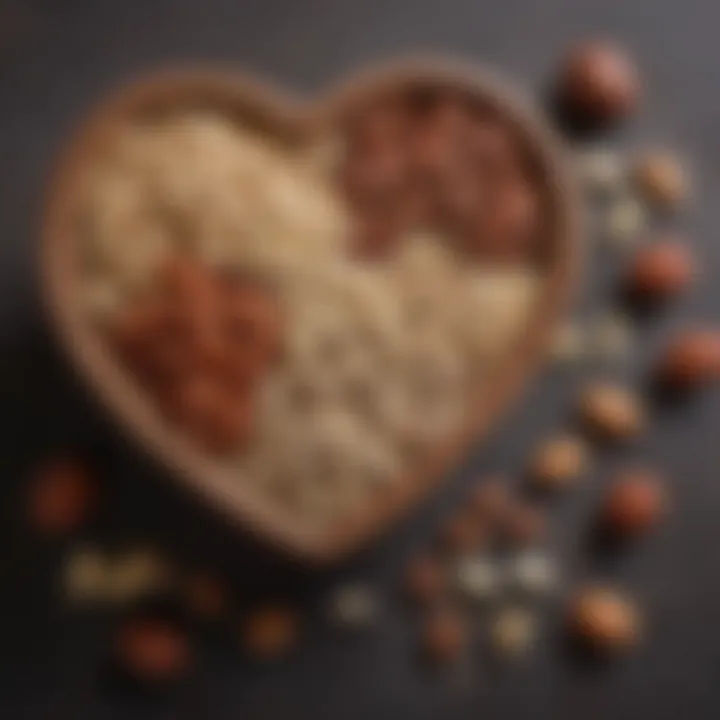Healthy Snacks for High Cholesterol: Culinary Options


Intro
Managing cholesterol levels is crucial for heart health. The role of diet cannot be underestimated in this process. With growing awareness surrounding the impact of dietary choices, it becomes essential to explore healthy snacking options tailored to individuals dealing with high cholesterol. Snacks can either support or hinder one's dietary goals. Thus, it is vital to understand which snacks to embrace.
This article provides a detailed examination of culinary options that align well with heart-healthy guidelines. It seeks to deliver insightful recommendations on snacks that are not just nutritious but also enjoyable to consume. The subsequent sections will delve into specific recipes, ingredient considerations, and practical preparation methods aimed at supporting a cholesterol-conscious lifestyle.
Understanding Cholesterol
Understanding cholesterol is fundamental for anyone concerned about their health, particularly those managing high cholesterol levels. Cholesterol plays a critical role in the body. It is a waxy substance that is present in every cell and is essential for the production of hormones, vitamin D, and bile acids that help digest fat. However, not all cholesterol is created equal, and its different types can have varying effects on heart health.
In this article, we will explore the basics of cholesterol, the types that exist, and their implications for health. Knowledge of these elements helps individuals make informed dietary choices. By understanding cholesterol better, you can navigate the often-confusing landscape of nutritional advice and focus on what truly benefits your heart.
What is Cholesterol?
Cholesterol is a lipid found in the blood. It is produced by the liver and can also come from certain foods. Importantly, cholesterol does not dissolve in blood; it requires transport proteins called lipoproteins. These proteins carry cholesterol to different parts of the body. There are two main types of cholesterol: low-density lipoprotein (LDL) and high-density lipoprotein (HDL).
Types of Cholesterol
LDL: The 'Bad' Cholesterol
Low-density lipoprotein is often referred to as "bad" cholesterol. This type carries cholesterol from the liver to cells. Excess LDL can lead to the buildup of plaque in arteries, increasing the risk of heart disease. The key characteristic of LDL is that high levels are associated with greater cardiovascular risk.
Managing LDL is significant in dietary choices, especially for those with high cholesterol. One should aim to lower LDL levels through lifestyle changes, including dietary adjustments that favor heart-healthy foods.
HDL: The 'Good' Cholesterol
High-density lipoprotein is known as "good" cholesterol. Its primary function is to transport cholesterol away from the arteries and back to the liver, where it is processed or removed from the body. Higher levels of HDL are linked to a lower risk of heart disease. The unique feature of HDL is its protective effect on the cardiovascular system, making it a desirable target for improvement in any cholesterol management plan.
Dietary choices that can help increase HDL include healthy fats found in avocados and olive oil. This reinforces the importance of incorporating heart-friendly ingredients into meals and snacks.
Triglycerides
Triglycerides are another type of fat found in the blood. They are stored in fat cells and can provide energy for the body. However, high levels of triglycerides can increase the risk of heart disease and are often associated with other health conditions, such as obesity and type 2 diabetes.
Understanding triglycerides is also crucial for individuals focusing on heart health. They serve as a reminder of the overall balance of fats in the diet. Keeping both triglyceride and LDL levels low contributes to better cardiovascular health.
Health Implications of High Cholesterol
High cholesterol can lead to several health complications, the most significant being heart disease and stroke. When LDL levels are elevated, the risk of atherosclerosis increases, which is the hardening and narrowing of arteries due to plaque buildup. This can lead to serious conditions like heart attacks or strokes.
Conversely, understanding the balance between different types of cholesterol can guide dietary and lifestyle choices. A focus on increasing HDL and managing LDL and triglycerides can contribute to long-term heart health, accentuating the need for a mindful approach to snacks and meals.
In summary, understanding cholesterol is vital not just for individual health but for promoting better choices in one's diet. Armed with this knowledge, one can make informed decisions that favor heart health.
Nutritional Guidelines for Managing Cholesterol
Managing high cholesterol effectively revolves around understanding and applying sound nutritional guidelines. These guidelines not only help in maintaining heart health but also support overall well-being. Individuals must prioritize their dietary choices to enhance their quality of life. This section will elucidate several crucial components, including the understanding of fats, the importance of fiber, and the role of antioxidants. Each of these elements plays a significant part in cholesterol management and can lead to beneficial outcomes when adopted.
Understanding Fats
Types of Dietary Fats
Dietary fats are an essential component of a balanced diet. Understanding the types of dietary fats is paramount for those managing cholesterol levels. There are three primary types: saturated, unsaturated, and trans fats.
- Saturated Fats: These are typically solid at room temperature and are found in animal products like butter and cheese, as well as some oils such as palm oil. High intake of saturated fats can raise LDL cholesterol levels.
- Unsaturated Fats: Unsaturated fats, which include monounsaturated and polyunsaturated fats, are liquid at room temperature. They can be found in foods like olive oil, nuts, and avocados. These fats are considered beneficial, as they help lower bad cholesterol while promoting good cholesterol.
- Trans Fats: Often found in processed foods, trans fats are particularly harmful. They raise LDL cholesterol levels and lower HDL cholesterol levels, increasing cardiovascular risks.
It's clear that unsaturated fats are preferable. They are a key aspect to consider when choosing snacks for cholesterol management.


Recommended Daily Fat Intake
The recommended daily fat intake for most adults is about 20% to 35% of total daily calories. This includes around 5% to 10% for saturated fats. This guideline helps to ensure that one consumes beneficial fats while limiting those that are detrimental.
Monitoring fat intake is crucial. It encourages individuals to focus on high-quality fats, which support a heart-healthy lifestyle. For instance, incorporating olive oil instead of butter can make a positive difference. Incorporating whole food sources of fats helps in balancing overall dietary needs, making it easier to manage cholesterol levels effectively.
Incorporating Fiber
Soluble vs. Insoluble Fiber
Fiber is another critical component that impacts cholesterol levels. Both soluble and insoluble fiber play important roles. Soluble fiber can dissolve in water and is known to help lower LDL cholesterol. Foods such as oats, beans, and apples are rich in soluble fiber. On the other hand, insoluble fiber adds bulk to the digestive system but does not affect cholesterol levels directly. It is abundant in foods like whole grains and vegetables.
Thus, incorporating a mixture of both types of fiber into the diet is essential. It aids in digestion and supports heart health, aligning with cholesterol management goals.
Fiber-Rich Foods
Fiber-rich foods are not only beneficial for digestion but also crucial in lowering cholesterol. These foods provide nutrients while enhancing satiety, which makes them favorable in a snacking context. Foods like lentils, whole grains, fruits, and vegetables should take center stage in meal planning.
Including fiber-rich options in your diet can lead to more significant and sustained health benefits over time. It also exemplifies a strategic approach to controlling cholesterol levels and improving heart health.
Importance of Antioxidants
Antioxidants play a vital role in protecting the body from oxidative stress. This is particularly important for heart health, as oxidative stress can lead to the development of cardiovascular diseases. Foods rich in antioxidants, such as berries, nuts, and dark green vegetables, can significantly impact cholesterol management. By consuming a variety of these foods, one can combat free radicals and support overall health, which is crucial for individuals managing high cholesterol.
Snack Options for High Cholesterol
When addressing high cholesterol, snack options are essential. Snacks can provide an opportunity to incorporate heart-healthy ingredients into your diet. Picking the right snacks helps maintain nutrition without derailing your cholesterol management efforts. Healthy snacks support heart health, offer fiber, antioxidants, and can keep cravings in check. Therefore, focusing on nutritional snacks is key to a balanced diet for individuals managing cholesterol levels.
Nuts and Seeds
Nuts and seeds are excellent snack choices for high cholesterol. They are rich in healthy fats, fiber, and essential nutrients. When eaten in moderation, nuts and seeds can help lower LDL cholesterol and provide satiety.
Almonds
Almonds are a standout nut in cholesterol management. They are high in monounsaturated fats, which have been shown to improve heart health. The key characteristic of almonds is their vitamin E content. Vitamin E acts as an antioxidant, helping to protect cells from damage. One unique feature of almonds is their ability to provide a satisfying crunch while being nutrient-dense. However, individuals must be mindful of portion sizes, as almonds are calorie-dense.
Walnuts
Walnuts contribute significantly to heart health, primarily due to their high omega-3 fatty acid content. This characteristic makes them a powerful option for improving cholesterol profiles. Walnuts can help decrease inflammation and reduce arterial plaque. A unique feature of walnuts is their ability to promote brain health, offering cognitive benefits. Nevertheless, consuming too many walnuts at once can lead to excess caloric intake, so moderation is essential.
Chia Seeds
Chia seeds are small yet immensely nutritious. They offer a rich source of omega-3 fatty acids, fiber, and protein, making them a great choice for cholesterol management. A key characteristic of chia seeds is their ability to absorb liquid, expanding in size and providing a feeling of fullness. Their unique feature is versatility; they can be added to smoothies, oatmeal, or yogurt. However, some people may find the texture off-putting if they are not mixed well with other foods.
Fruits and Vegetables
Incorporating fruits and vegetables into snacks can greatly enhance dietary quality while supporting cholesterol levels. These foods are low in calories and rich in vitamins, minerals, and antioxidants, further promoting heart health.
Berries
Berries are nutrient-dense snacks. They are loaded with antioxidants, which can help reduce inflammation and lower cholesterol levels. A key characteristic of berries is their low glycemic index, making them suitable for snacking. Their bright colors signify a wide range of vitamins and minerals. A unique feature of berries is their natural sweetness without added sugars, making them an enticing snack option. Some may find fresh berries more expensive or less convenient than other fruits.
Avocado
Avocados are a creamy and satisfying snack choice. Rich in monounsaturated fats, they help to reduce bad cholesterol levels. The key characteristic of avocados is their fiber content, which aids digestion and promotes satiety. A unique feature of avocados is their versatility; they can be enjoyed alone, in guacamole, or on whole-grain toast. However, calorie-conscious individuals should monitor portion sizes, as avocados are calorie-rich.
Carrots and Hummus


Carrots paired with hummus is a crunchy, nutrient-rich snack. Carrots provide beta-carotene and fiber, promoting overall health. The key characteristic of hummus is its protein content from chickpeas, making this combination satisfying. The unique feature of this snack lies in its flavors; you can customize hummus with various herbs and spices. Some people may find hummus high in calories depending on the choice of ingredients used in the recipe.
Whole Grains
Whole grains provide fiber and nutrients that can help manage cholesterol levels effectively. Snacks that include whole grains may contribute to heart health while providing sustained energy.
Popcorn
Popcorn is a whole grain that can be a healthy snack when prepared correctly. Air-popped popcorn is low in calories and high in fiber, which can help lower cholesterol. Its key characteristic is its natural crunch and versatility; it can be flavored with herbs or spices. A unique feature of popcorn is that it serves as a satisfying snack without many calories. However, pre-packaged popcorn can be high in salt and fats, making homemade options a better choice.
Oatmeal Bites
Oatmeal bites are a convenient snack loaded with soluble fiber, which can aid in cholesterol management. They are chewy and satisfying, making them a perfect portable option. A key characteristic is their energy-boosting capability. Oatmeal bites often contain mixes of nuts and fruits, adding flavor and nutrition. However, commercially prepared versions can be high in sugar, necessitating careful ingredient checks.
Whole Grain Crackers
Whole grain crackers offer a crunchy snack that can satisfy cravings without unhealthy fat. They are rich in fiber and can be paired with healthy dips or spreads. A key characteristic is their versatility, working well with various toppings. The unique feature is their portably — they can be easily taken on the go. However, not all crackers are created equal; some may include added sugars or unhealthy fats.
Legumes
Legumes are often underappreciated yet rewarding snacks that provide a host of benefits for managing cholesterol.
Lentils and Beans
Lentils and beans are excellent sources of plant-based protein and fiber. They are effective in promoting heart health by lowering cholesterol levels. A key characteristic of these legumes is their ability to be versatile in preparation; they can be used in salads, hummus, or alone as snacks. A unique feature of lentils and beans is their low cost and long shelf life. However, some individuals may experience digestive discomfort after the consumption of legumes.
Chickpea Snacks
Chickpea snacks, such as roasted chickpeas, are a crunchy alternative to traditional snacks. They are high in protein and fiber, contributing to cholesterol management. The key characteristic is their satisfying crunch that can replace unhealthy chips. A unique feature is the variety of flavors that can be added during preparation. However, homemade versions may require an initial investment in time for preparation.
Dairy Alternatives
Dairy alternatives provide nutritious options that support overall health and are suitable for individuals managing cholesterol levels.
Greek Yogurt
Greek yogurt stands out for its high protein content, helping keep hunger at bay. It also offers probiotics which can benefit gut health. A key characteristic of Greek yogurt is its creaminess, which can satisfy cravings for rich textures. The unique feature is its ability to be flavored naturally with fruits or honey. Some flavored varieties may contain added sugars that can counteract health benefits, so choosing plain versions is advisable.
Nutritional Yeast
Nutritional yeast is a unique food that is rich in B vitamins and provides a cheesy flavor without dairy. It is an excellent choice for those seeking to reduce cholesterol. The key characteristic is its protein content, making it a great addition to snacks or meals. A unique feature of nutritional yeast is its ability to enhance the flavor of various dishes. However, some may not enjoy its taste or texture.
Understanding these snack options equips individuals with practical ideas to manage their cholesterol while enjoying delicious, nutritious diets.
Preparing Healthy Snacks at Home
Preparing snacks at home is a vital aspect of managing high cholesterol effectively. It provides control over the ingredients, portion sizes, and flavors, allowing individuals to tailor their snacks to meet dietary needs. Homemade snacks can often be healthier than their store-bought counterparts. They usually avoid high levels of additives, sugars, and unhealthy fats. In essence, making snacks at home can transform the way one approaches healthy eating.
The benefits extend beyond health. Preparing snacks at home can be more economical than purchasing pre-packaged options. It encourages creativity and experimentation with flavors and textures. This can lead to discovering new favorites that align with cholesterol management goals. Overall, home-prepared snacks contribute to a more intentional and mindful eating experience.
Simple Recipes
Trail Mix
Trail mix is a simple yet highly customizable healthy snack. It typically consists of nuts, seeds, dried fruits, and sometimes dark chocolate. The key characteristic of trail mix is its high nutrient density. It offers a good balance of protein, fiber, and healthy fats, which are essential in managing cholesterol levels.
A beneficial choice, trail mix can serve as a portable snack. It is easy to prepare in batches and can be taken anywhere. The unique feature of trail mix is its versatility. You can mix different nuts and dried fruits according to taste preferences.


However, moderation is necessary. Nuts, for example, are high in calories. Overconsumption can lead to unwanted weight gain, which can impact cholesterol levels negatively. Overall, trail mix is an accessible and practical snack that supports heart health when consumed wisely.
Homemade Granola Bars
Homemade granola bars provide a delicious snack option that can be tailored to individual dietary needs. They commonly include oats, nuts, and seeds, held together with a sweetener like honey or maple syrup. A highlight of homemade granola bars is the absence of high-fructose corn syrup and preservatives found in many store-bought varieties.
These bars are a popular choice because they can be made in bulk, providing snacks for several days. The unique aspect lies in their adaptability. You can add ingredients like chocolate chips or dried fruits to suit personal tastes, making them enjoyable for all ages.
One drawback may be the need for proper storage to maintain freshness. If not stored correctly, they can become stale. But when prepared and handled well, homemade granola bars represent a flavorful method to enhance nutrient intake and manage cholesterol levels effectively.
Batch Cooking Techniques
Freezing Snacks
Freezing snacks is an excellent method for preserving homemade options, ensuring healthy choices are always within reach. This technique allows for the preparation of larger batches of foods like smoothies or veggie bites. The key benefit of freezing is convenience; having ready-to-eat snacks means one is less likely to reach for unhealthy options.
Frozen snacks can retain their nutritional value as they are often sealed shortly after preparation. The unique feature of this method is the flexibility it offers for meal planning. You can easily pull out a portion whenever needed, providing a quick source of nutrition. However, it is crucial to use appropriate freezing techniques to avoid freezer burn and loss of quality.
Meal Prepping Ideas
Meal prepping ideas encourage efficient snack preparation, making healthy eating more manageable. This practice can involve setting aside specific times to cut vegetables, portion nuts, or cook healthy snacks in advance. The key characteristic of meal prepping is its focus on organization. By planning ahead, individuals can avoid last-minute unhealthy eating choices.
A beneficial choice, meal prepping allows for creative combinations, helping to keep snacks interesting. You can experiment with different ingredients without feeling rushed. However, it’s essential to keep an eye on portion sizes. Over-prepping too many snacks can lead to waste if they are not consumed timely. Overall, meal prepping equips individuals with the tools to stay on track with managing high cholesterol.
Avoiding Common Pitfalls
Managing high cholesterol is a complex task that requires a careful approach to food choices. While there are many healthy snacks available, it is essential to avoid certain pitfalls that can undermine efforts to maintain optimal heart health. This section highlights common dietary traps that can lead to increased cholesterol levels and offers strategies to navigate around these issues.
High Sugar Snacks
High sugar snacks pose a significant risk for individuals watching their cholesterol. These snacks are often linked to weight gain and metabolic issues, which can exacerbate cholesterol levels. Products like candy bars, sugary granola bars, and soft drinks might seem appealing but usually contain excessive amounts of refined sugars. It is important to scrutinize food labels and opt for snacks that have low sugar content. Snacks should ideally include natural sweeteners or fruit as their primary source of sweetness.
Processed Foods
Processed foods tend to be high in unhealthy fats, sugars, and sodium. Items like chips, pastries, and sugary cereals often contain ingredients that can contribute to high cholesterol. These foods are also typically low in nutrients and fiber, which are important for heart health. It is crucial to limit intake of processed snacks and instead prepare whole food options whenever possible. Whole foods ensure that nutritional integrity is maintained while effectively managing cholesterol levels.
Overlooked Ingredients
Hidden Trans Fats
Hidden trans fats can be a sneaky addition to many commonly consumed snacks. These fats are often found in partially hydrogenated oils, which can significantly raise LDL cholesterol while lowering HDL cholesterol. They are beneficial neither for cholesterol management nor overall health. One must always check the ingredient list, as trans fats can be present in seemingly healthy options like ready-made salad dressings and baked goods. Therefore, choosing snacks prepared from scratch, or selecting products clearly labeled as trans fat-free, should be the priority.
Sodium Content
Sodium plays a critical role in hypertension and heart disease, and monitoring its intake is important for managing cholesterol levels. Many snacks, particularly those that are processed, may have high sodium levels lurking within them. Foods like salted nuts, packaged crackers, and processed cheese have high sodium concentrations, which can contribute to fluid retention and increased blood pressure. Reducing sodium intake involves opting for fresh, whole ingredients and using herbs and spices for flavoring instead of salt.
"Being mindful of ingredient lists can make a significant difference in managing high cholesterol effectively."
In summary, avoiding these common pitfalls involves a conscious effort in selecting snacks wisely. Staying informed about hidden ingredients, sugar content, and opting for whole, unprocessed foods are essential in achieving a heart-healthy lifestyle.
The End
Effective cholesterol management relies on a multifaceted approach, and the role of snacks is often overlooked in this journey. Healthy snacks serve not only to curb hunger between meals but also to provide an opportunity to incorporate essential nutrients beneficial for heart health. In this article, we have dissected various snack options that are aligned with dietary restrictions for high cholesterol, ensuring that each option remains delicious and satisfying.
The Role of Snacks in a Cholesterol Management Plan
Snacks can be strategically integrated into your dietary regimen to combat high cholesterol levels. This approach supports metabolic health and stabilizes blood sugar levels. Adequate and nutritious snacks enhance overall nutrient intake, which minimizes the chance of reaching for unhealthy options, particularly between meals. Each snack choice reflects a significant consideration of dietary fats, fiber content, and antioxidant properties.
Many of the recommended snacks are rich in fiber. Fiber helps lower LDL cholesterol, thereby improving overall cholesterol ratios.
Additionally, snacks such as almonds, berries, and whole grains provide antioxidants which combat oxidative stress, a contributor to cardiovascular disease. Over time, consistently choosing healthier snacks can lead to significant improvements in cholesterol readings and heart health.
Remember: Thoughtful snacking can facilitate a more satisfying and health-conscious eating pattern!
Incorporating these snack ideas into daily life requires some adjustments, but the benefits far outweigh the challenges. The experience becomes rewarding, not just through improved health metrics, but also through the joy of exploring new flavors and textures.







